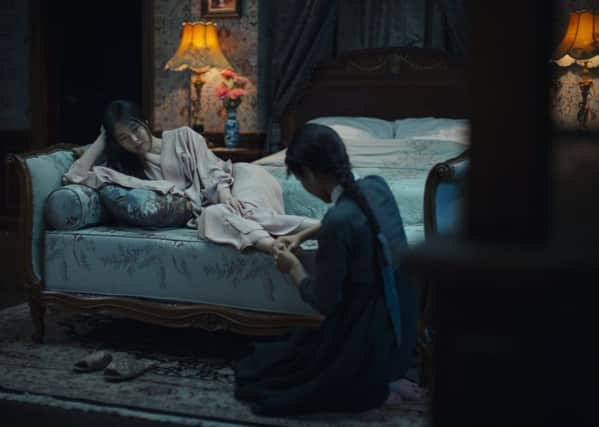Film reviews: The Handmaiden, A Quiet Passion, The Sense of an Ending


The Handmaiden (18) *****
A Quiet Passion (12A) ****
The Sense of an Ending (15) ***
Old Boy director Park Chan-wook might not seem like an obvious choice to bring Sarah Waters’ Man Booker-nominated bestseller Fingersmith to the big screen, but that’s a big part of the success of The Handmaiden. Transposing the action to Japanese-controlled Korea in the 1930s, the film sees him transform Waters’ Victorian-set lesbian crime saga into a bold, beautiful and way-out-there female revenge story that eschews the bloodless nature of most costume dramas to revel in the lusty passions, kinky hobbies and digit-dicing proclivities of its main characters.
Told – as the novel was – from multiple perspectives, it’s a story with audacious twists and turns that shouldn’t be spoiled in a review, but suffice to say that Park handles the convoluted tale of a young, streetwise maid who falls for the mistress she’s supposed to be defrauding with the kind of verve that makes Tarantino’s most recent work so thrilling and unusual. Replete with graphic sex scenes and ripe melodrama, The Handmaiden also has all the hallmarks of an erotic thriller, but it comes with an explicit feminist bent that celebrates the way its protagonists find strength in each other as they push back against the twisted realities imposed on them by the men in their lives.
Advertisement
Hide AdFor Japanese heiress Lady Hideko (Kim Min-hee) that’s her pervy Korean uncle Kouzoki (Cho Kin-Won), who has sequestered her in an elaborate mansion that functions as a shrine to Japan and the west – as well as to an eye-watering collection of erotic literature that he regularly shares with his creepy all-male libertine book group. For the younger Sook-hee (Kim Tae-ri), a pickpocket and grifter recruited to work in Lady Hideko’s house, it’s the boorish Count Fukinawa (Ha Jung-woo), whose sense of entitlement blinds him to the fact that he’s not as smart as the women he’s attempting to exploit. Nothing is quite what it seems here, something emphasised by the hidden layers of meaning encoded within the film’s sumptuous production and costume designs, things that Park’s camera positively fetishises. But it’s the way Sook-hee and Hideko individually take control of their stories that ultimately transforms this puzzle-box of a movie into such a liberating and entertainingly outré thriller.
The oppressive nature of patriarchal society is one of the themes Terence Davies teases out in A Quiet Passion, his elegant film about Emily Dickinson. Presenting the poet as a quiet revolutionary, someone unwilling to be cowed by either the piety of American life in the Civil War era or the domineering belief that literary prominence and permanence should be the sole preserve of male writers, the film delivers a beautiful, sometimes witty, often desperately sad portrait of an artist all too aware of the injustice of being unread in her lifetime. Her refusal to view her talent as a consolation prize for inequality and potential posterity as a salve for literary invisibility causes a sorrow in her that’s as deep and complex as her work, something brilliantly captured by Cynthia Nixon’s haunted performance as Dickinson.
After an opening sequence in which the young Emily (played by Emma Bell) is rescued by her loving family from an all-girls seminary, Davies confines the remainder of the movie to the Dickinson family home, where Emily’s father (Keith Carradine) allows her to write during the earliest hours of the morning and where she’s able to spend her afternoons and evenings trading sly witticisms with her sister Vonnie (Jennifer Ehle), her brother Austin (Duncan Duff) and her sharp-tongued friend Vryling Buffam (Catherine Bailey). Though the house at once seems idyllic, it’s also a place in which ideals have their limits: Emily’s determination to protect her independence comes at a price as frustration and bitterness begin to dim her spirit and harden her against the joy to be found all around her.
An expressionistic filmmaker, Davies’s past adaptations of House of Mirth and Sunset Song benefitted from his ability to match source material to images in ways that set the texts free on screen even while liberally quoting from them – so it’s hardly surprising he makes judicious use of Dickinson’s poems here. Deploying them in hushed voice-over, he uses her verse to further articulate her interior life, offsetting the film’s slightly mannered, precisely calibrated dialogue with an emotional intensity that Nixon’s brilliantly judged performance more than matches.
Unlike A Quiet Passion and The Handmaiden, The Sense of an Ending feels far too constrained by its literary source material. This is despite Julian Barnes encouraging the film’s makers to freely adapt his 2011 Man Booker-winning novel of the same name. The film’s failings aren’t to do with questions of fidelity to the source material, however, but the lack of cinematic daring in its dramatisation of the story and its ideas about memory and time and the lies we tell ourselves (and others) when constructing our life stories.
That said, Jim Broadbent is very engaging in the lead role of Tony, a curmudgeonly retiree who’s forced to confront his past when the mother of his first love dies and leaves him a diary in her will. Alas, the way director Ritesh Batra (making his English-language debut after his gentle, Mumbai-set arthouse favourite The Lunchbox) fills in the backstory with a series of flashbacks feels very conventional and the parallel timelines never connect in an impactful way.
Advertisement
Hide AdWhen Charlotte Rampling pops up as the present-day version of Tony’s first love Veronica, the film invites unfavourable comparisons with 45 Years, which offered up a much more challenging, ambiguous and artistically satisfying exploration of similar themes.